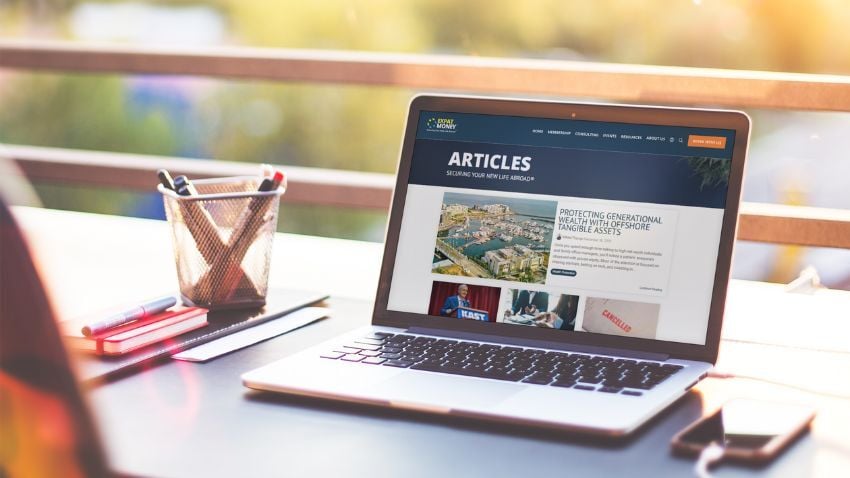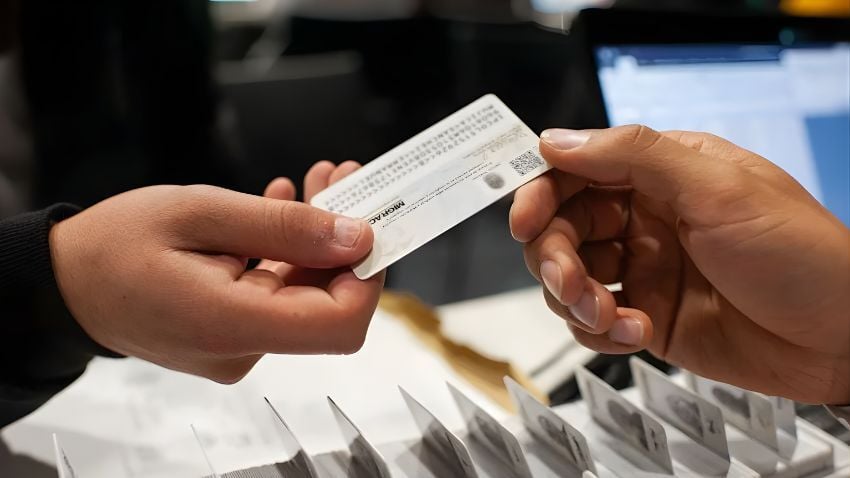The Different Types Of Residency You Need To Know
People choose the expat lifestyle for many reasons. Some seek greater personal freedom and better financial opportunities, while others want a lower...

6 min read
With governments worldwide tightening their grip, dual citizenship is no longer a luxury; it has become a strategic necessity for many. The benefits of holding a second passport are clear: greater security, increased freedom of movement, and, in many cases, the ability to pass it on to your children.
It’s not all smooth sailing, however. Several countries offer Golden Visa programs, while others have decided to shut them down altogether. That’s why, when putting together your Plan-B and choosing a second citizenship, it’s essential to weigh the pros and cons of each option carefully. On top of that, some programs are so expensive that it might be wiser to consider more affordable (and sometimes even more advantageous) alternatives.
In this article, we’ll show you the world's nine most expensive Golden Visa programs and where to start if you’re building your own Plan-B.
%20is%20Canada%E2%80%99s%20only%20passive%20investment-based%20immigration%20program.jpg?width=850&height=478&name=The%20Quebec%20Immigrant%20Investor%20Program%20(QIIP)%20is%20Canada%E2%80%99s%20only%20passive%20investment-based%20immigration%20program.jpg)
Quebec reopens its investor visa, with a total cost of $871,000 USD, requiring French language skills and a 1-year residency requirement in Quebec. A passive path to Canadian PR, now tougher but still unique in North America
The Quebec Immigrant Investor Program (QIIP) is Canada’s only passive investment-based immigration program. It offers a unique route to permanent residency without the need to start or manage a business in Canada.
In January 2024, Quebec revived its immigrant investor program, which had been on hold since 2019. The total cost of the program is $871,000 USD, consisting of a $725,000 USD interest-free investment with Investissement Québec (held for five years) and a $146,000 USD fee paid through an approved financial intermediary.
While applicants must use authorized intermediaries, affecting the initial payment, this analysis considers the total investment amount, placing Quebec’s program just ahead of the EB-5 visa in 9th place.
The updated program now imposes stricter criteria, including:
French proficiency at Level 7;
A secondary school diploma;
Residency in Quebec for at least 12 months within two years of receiving a work permit.
The Seychelles offers permanent residency to foreign investors who commit at least $1 million USD into a new or existing local business. To qualify, applicants must prove a five-year business involvement in the country and have legally resided there for at least five years under a valid permit.
Investors are required to maintain their capital throughout their residency and submit official documentation verifying their business investment. Additionally, they must demonstrate financial self-sufficiency for at least one year after receiving their Permanent Residence Permit. After 11 years of continuous residency, investors become eligible to apply for Seychellois citizenship.

El Salvador’s Freedom Passport grants citizenship for a $1M USD or Bitcoin investment. No residency required. Fast processing and BTC-friendly, it targets global investors and crypto pioneers
El Salvador offers citizenship through its Freedom Passport Program, which requires a one-time investment of $1 million USD or Bitcoin. The program is capped at 1,000 participants per year, and applications are processed in four to six weeks.
Designed for Bitcoin advocates and entrepreneurs, the initiative aligns with El Salvador’s pioneering adoption of Bitcoin as legal tender. Applicants must pay a non-refundable $999 USD fee (USD or BTC) per person, plus an additional $999 USD for each family member in group applications, and pass a background check. Notably, the program imposes no residency or physical presence requirements, making it an attractive option for global investors.
Saudi Arabia has joined the GCC Golden Visa trend with its Premium Residency Investor Visa, offering immediate permanent residency to qualified investors. The program provides two investment pathways: purchasing residential real estate worth SAR 4 million ($1.1 million USD) or committing SAR 7 million ($1.9 million USD) into Saudi-based business ventures.
For the real estate route, properties must be fully owned (no mortgages), and accredited Saudi appraisers must verify their value. The business investment option requires an official investment license and employment of at least ten Saudi workers. Notably, the visa imposes no residency requirements, and applications are typically processed within one month, making it an attractive option for global investors.
.jpg?width=850&height=478&name=Samoa%20offers%20an%20attractive%20citizenship-by-investment%20program%20requiring%20a%20minimum%20investment%20of%20SAT$4%20million%20(approximately%20$1.42%20million%20USD).jpg)
Samoa’s citizenship-by-investment program requires a $1.42M USD investment and 15 15-day/year stay for 3 years. Offers fast processing and sector flexibility from tourism to IT
Samoa offers an attractive citizenship-by-investment program requiring a minimum investment of SAT$4 million (approximately $1.42 million USD) in approved sectors. To qualify, applicants must maintain a personal net worth of at least SAT$2.5 million ($907,000 USD) and spend 15 days annually in Samoa during the three-year qualifying period.
The program welcomes investments across multiple sectors, including tourism development, agricultural projects, fishery processing operations, IT infrastructure, renewable energy initiatives, and government development funds. Applications are processed efficiently within two to three months, with successful applicants receiving immediate permanent residency status. Alternative qualifying options include approved fund investments or qualifying bank deposits, providing flexibility for different investor preferences.
Bermuda's Economic Investment Certificate Program provides a five-year path to permanent residency for qualified investors committing $2.5 million USD across approved investment categories. Eligible options include residential/commercial real estate, government bonds, the Bermuda Sinking Fund, registered charities, or new/existing Bermudian businesses. The program requires maintaining physical presence for at least 90 days annually, with British Overseas Territories citizenship becoming available after five years, provided the applicant spends no more than 450 days outside Bermuda during this period.
The application process costs $2,625 USD and typically takes one to two months to complete. Investors may include their spouse and dependent children in the application. This program offers an attractive route to residency in a stable British Overseas Territory with clear citizenship prospects for qualifying participants.
New Zealand's Revitalized Investor Visa Program now features a simplified $3 million USD investment pathway, accepting both direct investments and managed fund allocations. The program maintains one of the most flexible residency requirements globally, demanding only 21 days of annual physical presence in New Zealand.
In a strategic move to enhance global competitiveness, immigration authorities have removed the English language prerequisite—a change particularly aimed at attracting high-net-worth individuals from Asian markets. This policy revision follows the program's previous iteration, which saw disappointing uptake, with only 35 approved applications over two years.
Hong Kong's New Capital Investment Entrant Scheme requires a HKD 30 million (around $3.8 million USD) investment divided between a mandatory HKD 3 million (around $382,000 USD) government portfolio and HKD 27 million (around $3.4 million USD) in approved assets. The scheme offers a pathway to permanent residency after seven years.
The program now accepts a diverse range of permissible investments, including non-residential property (capped at HKD 10 million - around $1.3 million USD), securities, debt instruments, and - in a significant update - high-value residential properties worth HKD 50 million (around $6.4 million USD) or more.
Notably, Hong Kong has embraced digital assets by allowing cryptocurrency holdings to satisfy the wealth requirement, though investors must convert these to qualifying investments within six months of approval. Recent reforms have substantially improved the program's attractiveness by slashing the asset holding period from two years to twelve months and expanding investment options. Since its March 2024 relaunch, the initiative has proven highly successful, processing 670 applications and attracting over HKD 20 billion in investment commitments, demonstrating strong market confidence in Hong Kong's residency offering.
Singapore tops the list with its Global Investor Programme (GIP), which requires a minimum investment of $7.78 million USD in a new or existing business. Investors can also choose to invest $19.4 million USD in a GIP-approved fund or establish a Single-Family Office with assets of at least $153.6 million USD, deploying a minimum of $38.9 million in approved investment categories.
The program grants permanent residency within six months of approval and demands a physical presence of only one day per year. After two years, residents can apply for citizenship but must renounce their original nationality, as Singapore does not recognize dual citizenship.
Singapore maintains full discretion in the approval process and may reject applications without explanation. The permanent residence status is renewed every five years through the Re-Entry Permit, and male children of PR holders must serve two years of National Service in Singapore’s military.

The proposed U.S. "Gold Card" would grant a Green Card for a $5M USD direct payment. Still unlegislated as of June 2025, it aims to offer a faster path to citizenship
President Donald Trump has proposed the "Gold Card" program, also known as the “Trump Card”, which would establish a new U.S. investment immigration pathway requiring a single $5 million USD direct payment to the federal government. This contrasts with existing programs, such as EB-5, which require business creation and job generation. The proposal offers immediate Green Card privileges, with a potential pathway to citizenship after meeting standard naturalization requirements.
As of June 2025, the proposal remains in development without formal legislation. Immigration policy analysts note it would require either Congressional approval or creative legal framing to bypass standard legislative processes.
The world’s most expensive Golden Visa programs reveal a clear trend: sovereignty and security come at a premium. From Singapore’s elite investor pathway to Saudi Arabia’s luxury residency, nations are capitalizing on high-net-worth individuals seeking alternatives to increasingly restrictive regimes.
Each program serves distinct strategic purposes, whether prioritizing visa-free global access, tax optimization, proximity to key markets, or backing innovative economies like El Salvador’s Bitcoin-driven vision. Recognizing these nuances ensures investors align their choices with long-term objectives, not just price tags.
With the world becoming increasingly authoritarian and Golden Visas being shut down worldwide, having a second residency or passport isn't a luxury but a matter of freedom and sovereignty - a decision that will impact future generations. To take the first steps in building your Plan-B, get your free special report on Plan-B Residencies & Instant Citizenships.
If you want the best intel from the expat world, including profitable offshore opportunities, little-known tax-saving strategies, and hard-won insights on immigration, passports, and Plan-B residencies, all delivered to your inbox every single week, then join our daily correspondence, EMS Pulse®. Currently enjoyed by over 84,000 expats and expat-hopefuls worldwide. Fill in the form below to join our newsletter free:

Written by Mikkel Thorup
Mikkel Thorup is the world’s most sought-after expat consultant. He focuses on helping high-net-worth private clients to legally mitigate tax liabilities, obtain a second residency and citizenship, and assemble a portfolio of foreign investments including international real estate, timber plantations, agricultural land and other hard-money tangible assets. Mikkel is the Founder and CEO at Expat Money®, a private consulting firm started in 2017. He hosts the popular weekly podcast, the Expat Money Show, and wrote the definitive #1-Best Selling book Expat Secrets - How To Pay Zero Taxes, Live Overseas And Make Giant Piles Of Money, and his second book: Expats Guide On Moving To Mexico.
.jpg)
People choose the expat lifestyle for many reasons. Some seek greater personal freedom and better financial opportunities, while others want a lower...

Every year brings new lessons, opportunities, and milestones worth revisiting. As 2025 comes to a close, we’re taking a moment to reflect on the...

Latin America has become one of the most straightforward regions in the world for securing residency. Most countries in the region offer simple,...